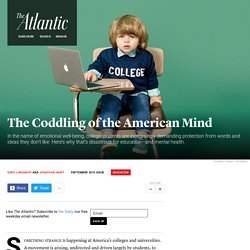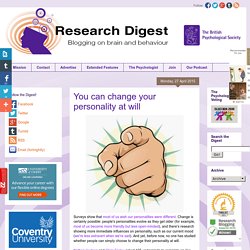

Repeat After Me - by Maki Naro. You A Scapegoat? Answers to Who’s Accountable For Learning – Regan A. R. Gurung. We all like having someone to blame.

Whether it is the state of the economy, security, sanctions (or lack thereof), it just seems to feel better if we can point a finger. Learning is no exception. Educators point fingers all the time. Americans bemoan the state of public education. States experiment with different ways to resurrect dropping exam scores and poor testing results. Yes. A short comic gives the simplest, most perfect explanation of privilege I've ever seen. Privilege can be a hard thing to talk about.

Oftentimes, when it's implied or stated that someone is "privileged," they can feel defensive or upset. They may have worked very hard for what they have accomplished and they may have overcome many obstacles to accomplish it. And the word "privilege" can make a person feel as though that work is being diminished. The key point about privilege, though, is that it doesn't mean that a person was raised by wealthy parents, had everything handed to them, and didn't have to do much other than show up. Privilege means that some of us have advantages over others for any number of reasons we don't control — like who we are, where we come from, the color of our skin, or certain things that have happened in our lives.
Even when things haven't come easy for some people, they can still have privileges that others don't have. Illustrator Toby Morris did some thinking about the concept of inequality and privilege, and he found one major problem. True story. Psychology Lessons from Key & Peele - PsySociety - Scientific American Blog Network. After three years and five seasons on the air, Key & Peele aired its final episode last week.

With its departure, we've lost a great source of pop culture education about social psychology. There were sketches during the past three years where Key and Peele used their platform on Comedy Central to teach us about key psychological principles in the study of... ...Aggression. According to one theory of aggression, people become aggressive because something has happened to make them feel like their goals have been blocked by an outside source. An Illustrated Book of Bad Arguments.
Six Famous Thought Experiments, Animated in 60 Seconds Each. How Trigger Warnings Are Hurting Mental Health on Campus. Something strange is happening at America’s colleges and universities.

A movement is arising, undirected and driven largely by students, to scrub campuses clean of words, ideas, and subjects that might cause discomfort or give offense. Last December, Jeannie Suk wrote in an online article for The New Yorker about law students asking her fellow professors at Harvard not to teach rape law—or, in one case, even use the word violate (as in “that violates the law”) lest it cause students distress. In February, Laura Kipnis, a professor at Northwestern University, wrote an essay in The Chronicle of Higher Education describing a new campus politics of sexual paranoia—and was then subjected to a long investigation after students who were offended by the article and by a tweet she’d sent filed Title IX complaints against her.
In June, a professor protecting himself with a pseudonym wrote an essay for Vox describing how gingerly he now has to teach. How Did We Get Here? The Thinking Cure 1. 2. Words and sorcery. Back in 1971 Stanislav Andreski’s Social Sciences as Sorcery slammed academics for their inability to write clearly.

There was, he argued, an ‘abundance of pompous bluff and paucity of new ideas’, a use of ‘obfuscating jargon’ to conceal a lack of anything to say. This was, Andreski argued, another reflection of modern society’s ‘advanced stage of cretinization’. Fast forward to 2013 and social psychologist Michael Billig’s superb Learn to Write Badly: How to Succeed in the Social Sciences. Billig, while clearly a fan of Andreski’s ‘gloriously ill-tempered stuff’, would recoil at his use of ‘cretinization’. ‘Here, then, is the centre of my argument’, Billig writes.
None of us want to live in that fictional world: a land of bluff and sorcery, of ivory towers, where maps of misunderstanding leave vast wastelands marked only ‘Here be dragons’. Beyond jargonHow many conference presentations have sailed right over your head? …Or blinkered? So what exactly is it that the bad writer lacks? You can change your personality at will. Surveys show that most of us wish our personalities were different.

Change is certainly possible: people's personalities evolve as they get older (for example, most of us become more friendly but less open-minded), and there's research showing more immediate influences on personality, such as our current mood (we're less extravert when we're sad). And yet, before now, no one has studied whether people can simply choose to change their personality at will. Nathan Hudson and Chris Fraley asked 135 undergrads to complete on-line tests and surveys about their different personality traits and about how they'd like their personality to change. Over the next 16 weeks, the students re-took the personality test each week.